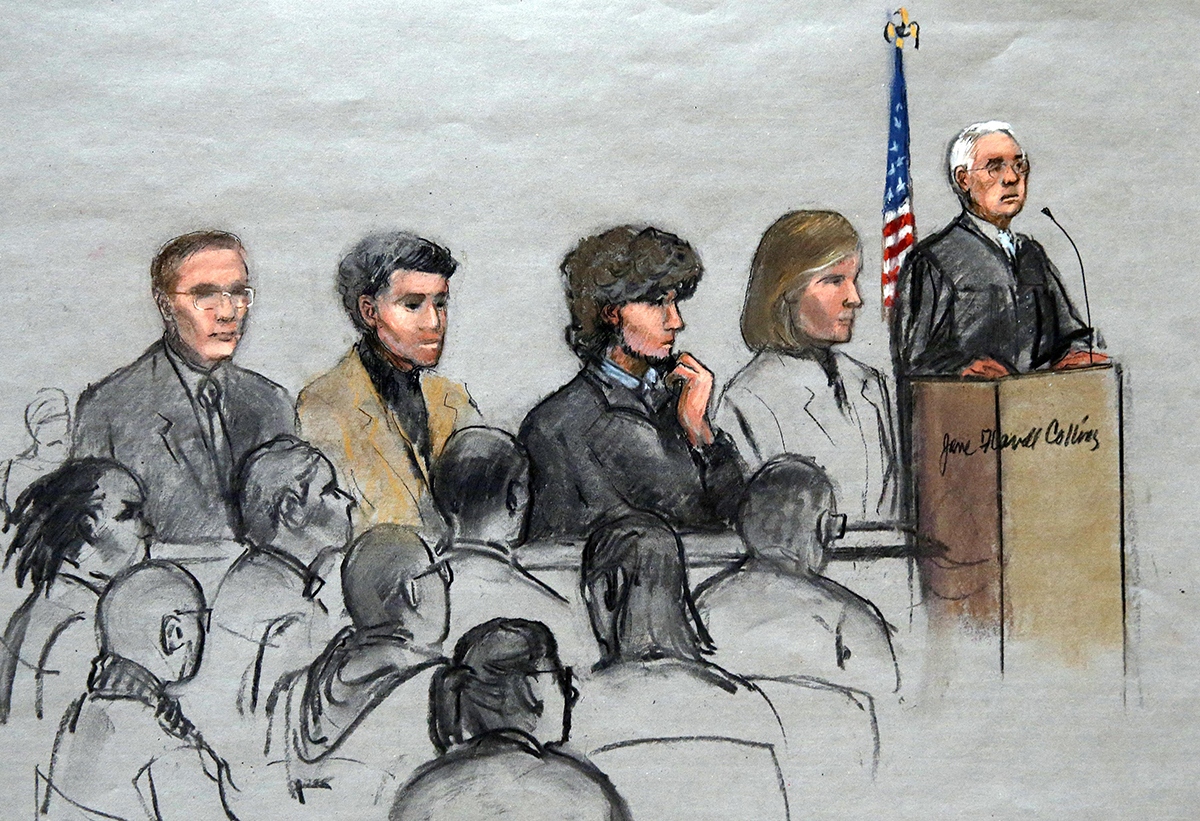New Trial Hearing For Tsarnaev a Preview of Long Legal Battle

Image via Associated Press
Courtwatchers got a taste of what the long post-conviction phase of the Dzhokhar Tsarnaev case will be like on Tuesday when attorneys for the government and the convicted marathon bomber met in court to argue over the possibility of a new trial.
Tsarnaev’s defense team argued before Judge George O’Toole that he should receive a new trial because half of the charges against him were broad enough that they likely influenced the decision to sentence him to death. Defense attorney William Fick and Assistant United States Attorney William Weinreb argued at length and in deep legalese about the “force clause,” which determines what is and is not violence according to the law, in the charges against Tsarnaev.
At issue for Fick was whether or not Tsarnaev actually used intimidating or violent physical force while committing 15 of the 30 charges against him.
“Given the number of and the weight of the charges, the loss of those convictions would mean an independent new trial should be held as to all counts,” said Fick.
Fick cited a June Supreme Court ruling, Johnson v. United States, which found that one of the felony statues Tsarnaev was prosecuted under was unfairly vague for legal application because it “fails to give ordinary people fair notice of the conduct it punishes.”
Weinreb disagreed.
“A common sense reading of all of these statues shows they do require the use of physical force,” said Weinreb.
O’Toole did not hear the defense’s change of venue argument with regard to a new trial.
Defense attorney Miriam Conrad argued strongly against what she perceived to be violations of attorney-client privilege rights for Tsarnaev, saying the prosecution’s access to what attorneys review with Tsarnaev while he is in prison is a violation of an agreement between the two legal teams.
Additionally, Conrad said a government agent sat in on a meeting between Tsarnaev and his sisters in an intimidating manner.
“He’s not serving a sentence, he is awaiting execution, and under statues he is entitled to certain legal representation. To pretend he is somehow treated like he is every other defendant is simply fantasy. Other defendants do not have agents sitting in on family visits or have prosecutors reviewing what lawyers bring in,” said Conrad.
Conrad argued that the government wants access to their information in the event of a retrial, something that is not entirely outside the realm of possibility.
“The litigation in this case is far from over,” said Conrad.
Weinreb argued the agreement was no longer valid because because they were voluntary measures the two sides took during the trial.
“We don’t think the court has the authority to tell the BOP [Bureau of Prisons] how to manage its matters. If the defense believes that may not be the case and wants a briefing, then it should be litigated. Let the defense file a motion and the court can see the legal arguments on other sides,” said Weinreb.
O’Toole is expected to rule on the matters at a later date. If he rejects the appeal for a new trial, the defense is expected to file a formal appeal.
Tsarnaev was not present in the courtroom for the hearing.
The two legal teams began the process for releasing sealed court documents when O’Toole informed them they would receive thumb drives with items to scrutinize. There is no timetable for the release.
“We were protective of the process, but the passage of time has made it unnecessary for them to remain under seal,” said O’Toole.
Detailed information about the jurors who served in the trial is not a part of the sealed documents due to be released to the public.


